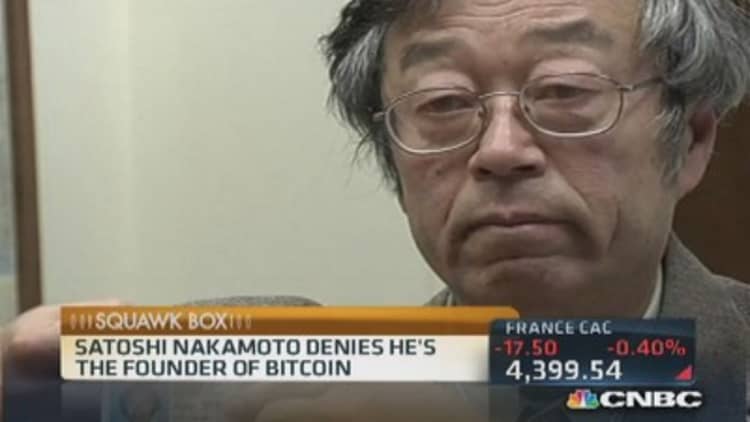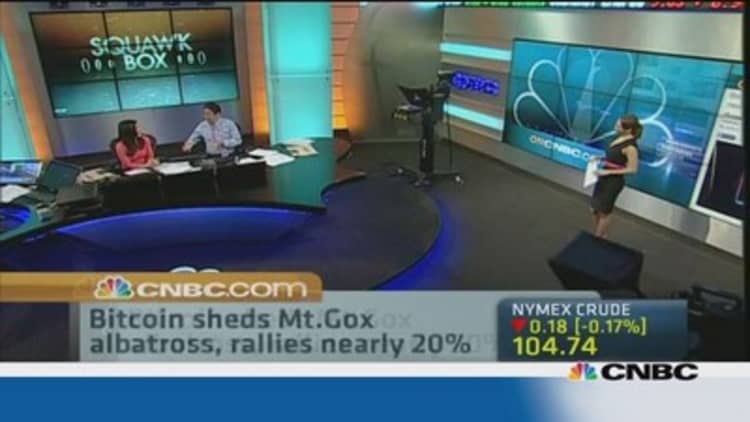At first glance, one might expect bitcoin to be something that would unite opponents of so-called fiat currencies—the government-printed dollars, yen and euros that form the backbone of global commerce but aren't backed by hard commodities like gold.
But that's not proving be the case. Not everyone who believes in currencies backed by gold believes in bitcoin.
"The main problem with bitcoin is it doesn't solve the problem of fiat money," said Peter Schiff, CEO of Euro Pacific Capital and a staunch defender of gold. "You have no store of value in bitcoin because there's no value to store."
The endorsement of bitcoin by marquee investors like Richard Branson, the Winklevoss twins and Marc Andreessen has done little to assuage skeptics who doubt bitcoin's potential as a long-term complement or competitor to gold.
(Read more: Head of virtual currency exchange found dead in Singapore)
In addition to its lack of security and its short history, Schiff argued that for the virtual currency to rival gold or regular money, it would need to be widely accepted as a form of payment. The government would also have to see it as a store of value, something that hasn't happened yet.
"If you want to open it up to the masses, you have to make it acceptable to the government. But that sacrifices everything that makes the currency attractive" including its anonymity, he said.
Bitcoin "is not an efficient payment system," Schiff said, other than to those he derided as "Libertarian techno-geeks. It's tulip mania 2.0," he said, referencing the notorious 17th century speculative bubble in flowers that took place in Holland. Schiff said he believes the same fate awaits the cryptocurrency in a matter of years.
'Gold, gold and nothing but gold'
One thing is certain: Bitcoin has seen vertigo-inducing volatility. Last year, the currency surged to a record high above $1,100, only to crash below $500 in the wake of , the largest bitcoin exchange. Late last week, the cryptocurrency flirted with $700.
On most policy topics, gold standard advocates still agree more than they disagree, especially when it comes to monetary policy and the perils of deficit spending.
Still, if it's not yet leading to a full-fledged schism, bitcoin has at least prompted a sharp debate between the old guard and the new.
(Read more: 'Real' bitcoin creator: 'I am not Dorian Nakamoto')
The cryptocurrency's enthusiasts, such as Austin Alexander of the Bitcoin Center in New York City, say with time and greater credibility, bitcoin can be more widely adopted. Traditionalists, he added, are fixated on "gold, gold and nothing but gold."
It will take years, Alexander said, for bitcoin "to compare to something like gold, which has had thousands of years of [convertibility], to develop into a mature payment mechanism."

Steve H. Hanke, professor of applied economics at The Johns Hopkins University and a scholar at the libertarian Cato Institute, pointed to bitcoin's volatility and lack of security. He called it "the speculative asset of the century."
Hanke, who directs the Troubled Currencies Project for Johns Hopkins and Cato, views the virtual currency's popularity as more computer science than economic theory. He said supporters were "computer geek" dilettantes with little appreciation for the historical evolution of currency.
"The ignorance of money is phenomenal," Hanke said, adding that bitcoin's biggest champions are "Silicon Valley kind of guys. None of this crowd has a clue about money and banking."
(Read more: Bitcoin's back to the wall as it fights to survive )
Although he considers himself bullish on electronic money, Hanke thinks bitcoin is too volatile—and its open-source code too insecure—to function as a challenger to fiat currencies.
"The wave of the future is virtual currencies, but as a means of transaction" like PayPal, credit and debit cards, said Hanke, who argued that a stable currency must be linked to a physical commodity to ward off hyperinflation.
"Stability is everything when it comes to currency ... and bitcoin is very unstable, and very volatile."
—By CNBC's Javier E. David. Follow him on Twitter @TeflonGeek.



